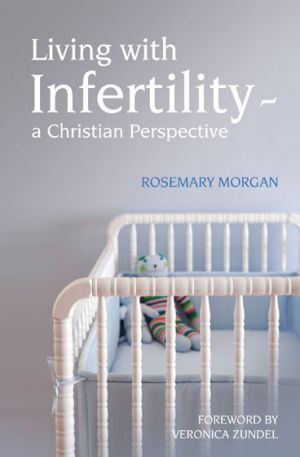Living with infertility, a Christian perspective

Infertility is estimated to affect around one in seven UK couples – approximately 3.5 million people, according to the Human Fertilisation and Embryology Authority.
Infertility is not a minority issue. Its pain of isolation, failure and stress, which can lead to marriage breakdown, is all too common.
Living with Infertility is Rosemary Morgan's story. It is not an account about living through infertility, as though it was a tunnel on the way to the ultimate destination of childbearing. It is a raw and very honest personal account about living within infertility—finding a way, against all the tears of despair, to continue to have a spiritual life and realising the need to do something more than simply sit around waiting for a baby.
The longing for a child of your own is an intense feeling. People talk about their biological clock ticking, telling them that it is time for them to have a baby. When you find yourself unable to have the baby that you want, it's as though your biological alarm has gone off. It can be a dizzying awakening to what's wrong with the world. It can suddenly jolt us into realising how unfair life can be, and how much needless suffering goes on all around us. (p. 25)
Rosemary devotes a chapter to each of the emotional states that can often accompany the journey of infertility. Drawing on her own experiences, she helps couples to find God in these emotionally driven periods by providing a biblical perspective on their feelings, concluding with a short prayer that aims to encourage couples to bring their feelings to God.
Anger and blame:
My experience of infertility did terrible things to my relationship with God. I was angry and disappointed; I avoided God. I remember sitting with another member of my church and hearing him say, 'Adversity can really bring people closer to God. When things are difficult, it can give us a wonderful sense of God's presence with us.' I was furious. I felt no such closeness, only pain. I felt forgotten by God. (p. 7)
Hope and despair:
The distress of infertility is a cyclical distress. Every month I have another chance to conceive a child. Every month brings a new chance and a new failure. The repeated failure is much more distressing than one single failure would be. The fact that this time might be different, this month might be the miraculous blessed month in which a real baby is conceived, means that it is impossible to do away with hope altogether. There are so many months of disappointment now that I do not know how to describe them. (p. 48)
Jealousy:
I almost hate people who have children!
Jealousy is caused by focusing too much on other people. We get jealous when we obsess about what others have got, rather than reflecting on what we've got in our own lives. I cannot actually arrange it so that nobody else gets the joy of a baby until we do (of course, I wouldn't really want that, even if I could do it). But I can try not to spend much time dwelling on thoughts of all the many people who do have children while I don't. (p. 67)
Confusion and decision-making:
Infertility is a serious health issue. One of the results of any chronic illness is a lack of trust in your own body. Once your body has failed you in an important way, it can be hard to trust it again. Barrenness can come to define you and your body, but this is not a healthy way to live. Your body belongs to you and you need to take care of it, because the experiences of your body will affect your mind and your soul as well. (p. 75)
Disappointment and letting go:
When we were dating, my now-husband once sent me a postcard with a picture of three children holding hands and running down the beach. He wrote a caption on the postcard saying that this was what he imagined our children would be like. That picture is branded on my mind. Where are those children?' (p. 93)
Loving and being loved:
We need to be aware of the effect that infertility can have on a marriage. Infertility forces us to watch our partner grieve. We can find ourselves distressed by our partner's sorrow and asking, 'Aren't I enough?' If our marriage is going to survive the storm of infertility, we have to protect it and put some effort into building it up. (p. 109)
Obsession:
Every month that passes is another failure; every Christmas is another Christmas without a child of your own; every birthday marks another year of childlessness. (p. 128)
The pain of infertility suffered by those within church circles is significant and often overlooked in a tradition that celebrates extensively new birth and motherhood. The benefit of this book for those suffering infertility comes from its blunt honesty.
Reading a book can't actually change things. It won't help you to get what you want; nor will it stop you wanting it. But reading a book can help to change us. New ideas and new ways of looking at old ideas can help us to see things from a different point of view. This book attempts to reframe the Christian experience of infertility, to enable you to see it in the context of a wider story of your life with God.
Rosemary Morgan is a Baptist lay preacher, writing from experience of infertility. From 2005 to 2009 she worked in Great Malvern Priory and retains links there; from 2006 to 2010 she was a Deacon at Malvern Baptist Church and she now attends Biggleswade Baptist Church
Living with Infertility is published on 15 February, priced £7.99, ISBN 978 0 85746 083 7,
Source: Bible Reading Fellowship











